Kingswinford Small Animal Centre
Kingswinford Small Animal Centre
In January 2002 we purchased an existing veterinary practice at Kingswinford which became our second branch surgery.
Like the Codsall branch surgery, clients have the convenience of their own local veterinary surgery, with the added reassurance that they have access to the full range of facilities at the Wolverhampton Hospital, should the need ever arise. Both branch surgeries’ computers are linked to the main Hospital computer system, allowing immediate access to patient records from any of our locations.
Discover Our Clinic
Services
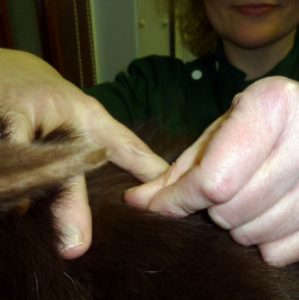
Acupuncture is offered alongside conventional therapies by vet Kathryn Cave.
Acupuncture is very useful in pain-related conditions such as arthritis, sprains and certain cases of back pain or paralysis. It can be used in combination with conventional treatments and is available at Wolverhampton and Kingswinford.
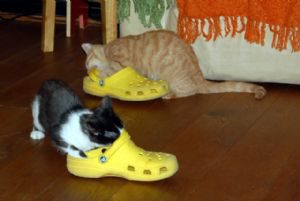
Pets, just like people, can develop behavioural problems which can become frustrating, and even embarrassing, for their owner.
Many behavioural problems can be corrected by advice alone if the problem is identified and dealt with at an early stage. In some cases medication, or even surgery, alongside behavioural advice may be required to help improve a behavioural problem.
Behavioural problems that we commonly encounter and advise on include antisocial behaviour, inappropriate urination and defaecation, separation anxiety, phobias and aggression.
If your pet needs help, telephone and we will direct you to a qualified member of staff for advice.
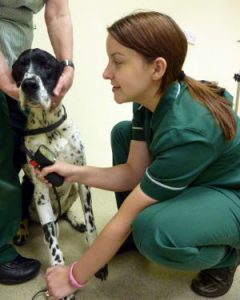
Blood pressure is a test done to determine the pressure of the blood against the walls of blood vessels.
This pressure is determined by how the heart pumps, the resistance to blood flow in the small arteries, the elasticity of the walls of the main arteries, how much blood is present and the blood viscosity or thickness.
Blood pressure measurement is performed using an inflatable cuff and an instrument to detect arterial blood flow. This technique is similar to what our physicians do on us to determine our blood pressure. This article focuses on the “indirect” blood pressure measurement method.
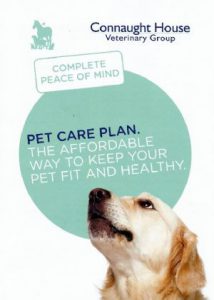
THE EASY WAY TO CARE FOR YOUR PET IN SIMPLE MONTHLY INSTALMENTS
Our Pet Care Plan allows you to spread the cost of caring for your pet (Dogs, Cats and Rabbits) throughout the year. It covers your pet for all of its basic health care needs, including treatments and expert advice, giving you complete peace of mind for your pet’s well being.
The Pet Care Plan guarantees your pet regular health check-ups, where we’ll dispense advice if it’s needed, along with support and treatment planning to prevent problems arising with your pet in the future.
The cost of maintaining the general health of your pet is then distributed throughout the year by monthly Direct Debit payments – plus you also qualify for an additional discount on other items and services in the practice.
Extra 10% discount on ALL our services and products when you take out a plan!!
OUR COMPREHENSIVE PET CARE PLAN GIVES YOU:
– Full clinical examination once a year with a vet including annual vaccination
– Worming treatments (sufficient for 12 months)
– Flea treatments (sufficient for 12 months)
– a 6 month health check with a nurse, which includes advice on general health, ears, eyes, weight, skin and teeth
– Nail clip
– Urine test
VACCINATIONS ON THE PET CARE PLAN
Vaccinations provide valuable protection for pets against many diseases and infections. Pet Care Plan covers your pet for:
Dog: Distemper, Hepatitis, Parvovirus, Parainfluenza, Leptospirosis
Cat: Flu, Enteritis, Leukaemia
Rabbit: Myxomatosis, Rabbit Haemorrhagic Disease
If you have any queries, please call any of our surgeries or ask a memeber of the team and they will tell you everything you need to know.
Hospital: 01902 424725
Codsall: 01902 842171 (Mo-Fr 4.30-6.30 pm)
Kingswinford: 01384 295949
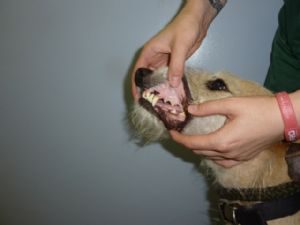
Dental hygiene is one of the most important aspects of caring for your pet.
Keeping your animal’s teeth and gums healthy will help to prevent not only bad breath, periodontal disease, and an uncomfortable or even painful mouth, but also more serious chronic conditions such as kidney disease, liver disease, heart conditions and joint problems.
There are many steps to help prevent this happening to your pet. Looking properly after your pets teeth requires daily brushing, a healthy diet, and exercise (chewing on hard food). Mouth wash, drops and supplements are also a good way of keeping your pet’s teeth in good condition. Regular check ups are important too. This is all simple to do and can be carried out at home. Should it be required, we can scale and polish teeth, and extract where necessary, under a general anaesthetic.
We are now running nurse dental hygiene clinics. A routine dental check is recommended every 3 – 6 months to discuss any oral care issues. This check will be carried out FREE OF CHARGE by one of our nurses by appointment only.
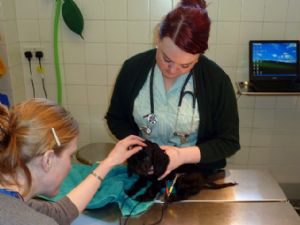
Cardiac arrhythmias are abnormal heart rhythms. These disorders are classified based on the area of the heart in which they originate. They are more common in large/giant dogs, but can occur in any animal.
They originate either in the upper chambers of the heart, the lower chambers of the heart, the area of the heart responsible for creating each heart beat (the sinoatrial [SA] node), or the system within the heart responsible for conducting electrical impulses throughout the heart.
Each heartbeat originates as an electrical signal generated in the SA node, which is in the upper right chamber of the heart. The electrical impulse then travels through the upper chambers of the heart (atria) to an intermediate station (the atrioventricular node), and finally to the lower heart chambers (ventricles). Series of these electrical impulses are responsible for the typical waveform seen on an electrocardiogram (EKG or ECG) and bring about the rhythmic mechanical contractions of the heart.
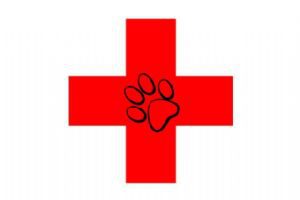
24 hour cover at the Hospital. ALWAYS provided by our own vets in your familiar hospital with your animals records to hand. We feel that this is very important. Very few practices provide this service now.
Please call 01902 424725 and listen to the recorded message. Please note that the message changes daily.

Home visits can be arranged but pets are usually best seen at the hospital where staff and facilities are on hand.
If you do not have your own transport or are unable to find a taxi firm prepared to carry animals, we have an ambulance service available.
Please telephone the surgery early in the morning (Tel: 01902 424725) or in advance if either of these services are required.
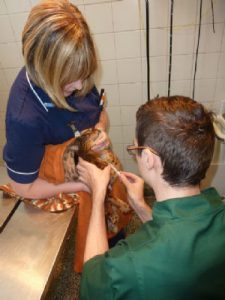
Available at both the hospital and the Kingswinford branch.
Our in-house laboratories contain advanced equipment allowing testing to be performed on blood, urine, skin and faecal samples. Results are usually available within 24 hours. Some samples may be sent to external specialist laboratories and results from these will take longer to be reported. For example, histopathology samples can take 7-10 days to be processed.
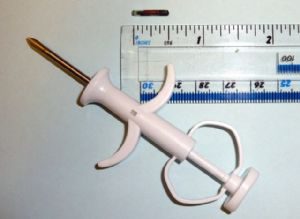
Around 250,000 animals go missing each and every year, microchipping these animals significantly
increases the chances of your lost pet finding its way home to you safely.
The microchip has a unique 15-digit number encased in a hard shell about the size of a grain of rice,
which is inserted under the skin between the shoulder blades and can be read with a microchip
scanner. Your details are registered to the microchip number and stored in a national database.
Once your pet is microchipped it is important to remember to update details when any changes are
made, e.g. moving to a new house or changing telephone number.
Since April 2016 it is a legal requirement that all dogs must be microchipped before they are 8 weeks
old. The law does not apply to cats, but we strongly recommend microchipping your feline friend,
especially if they are prone to roaming.
At Connaught House you can book an appointment with a vet or a nurse to have your pet
microchipped. The simple procedure only takes a minute, we will then register the chip for you and
supply you with the details of the company should you need to make any changes. We will also
provide a collar tag stating that your animal is chipped, but we suggest you also have a collar tag
with your contact details to make sure they can be identified easily if they stray.
If you acquire a new pet and are not sure if he/she is microchipped already then we can scan them
free of charge to find the microchip and provide you with the details of the company the chip is
registered to so you can update them. You can never be too careful, so we strongly advise you do
this immediately after the animal has been transferred to your care.
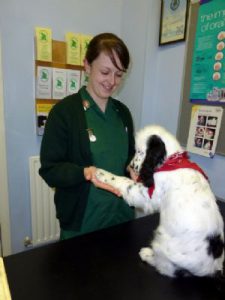
We offer free of charge consults and clinics with our team of experienced Veterinary nurses. Our nurses are always available and willing to discuss any aspect of preventative healthcare for your pets and offer their advice.
Our main priorities are you and your pet; we offer these clinics as a way to make sure you are receiving the best possible advice on your preventative healthcare regime throughout their lives from puppies/kittens to the later, geriatric stages. We want your pets to live longer, healthier lives and we want to get to know you so you feel comfortable contacting us for advice whenever you need it.
We have two Pet Health Councillor registered Veterinary Nurses; senior nurse Claire Cook RVN and Debbie Upton RVN. Claire and Debbie have been specifically trained on running nurse consultations and organise all of our clinics.
We offer the following range of clinics:
Weight clinics – we will weigh your pet, give a body condition score (and explain why), take
measurements of your pet, set a target weight, give nutritional advice and discuss exercise.
Mobility clinics – discuss changes in you pet that you have observed and the reasons why,
offer advice on what you can do to help, and discuss any supplements or medicinal
treatments you can use.
Puppy/Kitten clinics – our nurses will discuss all your new puppy/kittens needs from toilet
training to socialising, nutrition and behavioural advice as well as a chat about the pros and
cons of neutering.
Our nurses are an essential part of the veterinary team at Connaught House, and the advice they can
offer covers a huge range of subjects in relation to your pet. During a consult with a nurse you can
have any of the following:
Nutritional advice
Behavioural advice
Anal glands
Nail clip
Microchipping
Neutering advice and pre-neuter check
Flea/tick and worming advice and treatment
Dental hygiene advice
Post-operative check ups
Vaccination advice
To book in to see Claire or Debbie please call the practice on 01902 424725. Debbie is available on a
Monday or a Friday, and Claire most days of the week.
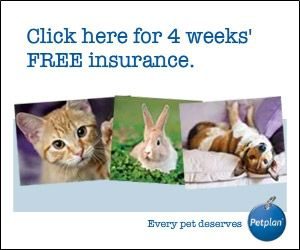
While we do not run our own insurance plan, advice can always be given about insurance services and the types of plan available.
The Connaught House Veterinary Group is an introducer practice for Pet Plan Insurance
Pet insurance can help provide you with the peace of mind that your pet can be offered the best possible treatment options, without the unexpected financial worry.
Click here for 4 weeks’ free insurance (Voucher ref: 1100003127).
The Pet Insurance Industry
The Pet Insurance Industry is regulated by the Financial Services Authority. Currently, market research indicates that only 15-20% of Pet owners have insurance for their pets. We believe you should have the right to choose the insurance that you feel is best for your pets and your budget.
Type of Insurance Products
Basically, there are three types of Pet Insurance.
Lifetime Policy: This has an annual maximum fee benefit, which is renewed at the end of the year. This is particularly useful if your pet develops a long term problem, such as arthritis or a heart complaint. This is the only type of policy that will guarantee long term cover.
12 Month Policy: This places a 12 month limit on claiming for a single condition. After this 12 month period, the condition will be excluded from further cover.
Maximum Benefit Policy: This places a monetary limit on the total amount that can be claimed for each treatment.
Vet Fee Benefits
Remember, the vet fee benefit is there to cover unexpected problems, and will not cover routine procedures or preventative health care. Conditions that have existed before you take out a policy, will also not be covered. Some policies may also exclude hereditary or congenital conditions, and some additional expenses, such as alternative treatments (acupuncture, homeopathy), special diets, hospitalisation and dental treatment.
Additional Benefits
Many companies include, or offer, some of the following benefits, which you may want to consider when choosing your Pets Insurance Policy.
Third Party Liability: This protects you if your pet causes an accident which results in injury to someone else, or damage to property.
Death Cover: This will compensate you for the death of your pet.
Loss Cover: This will compensate you for the cost of advertising, or providing a reward, for the return of a lost pet.
Boarding Fee Cover: This will pay for your pet to be boarded if you are unexpectedly hospitalised.
Holiday Cancellation Cover: This covers you in the event of a holiday having to be cancelled due to an unexpected illness of your pet.
Legal Help-lines
Counselling
Pet Travel Insurance This is available for pets travelling abroad under the “Pet Passport” scheme. Policies are available to simply cover veterinary fees incurred whilst travelling abroad. Others may cover for loss of documentation, repatriation, and in the worst scenario, quarantine.
When to Take Out Insurance
Obviously you never know when you are going to require the cover that pet insurance provides. Many companies have an upper age limit, above which they will not allow you to take out a policy. Any conditions that are on-going before the policy is taken out must be declared, and may be excluded, and there is often and initial period after starting the policy, when illnesses may not be covered.
The Cost
The cost of an insurance policy for your pet is therefore dependent on many factors. Not only does it take into account what level of benefits you choose, but it will vary with where you live, what breed of pet you have, and how old your pet is. Insurance premiums, and the excess payable, may therefore increase during the life of the policy.
Remember: YOU GET WHAT YOU PAY FOR
Click here for 4 weeks’ free insurance (Voucher ref: 1100003127).

Are you going on holiday?
If you are going abroad and wish to take your pet with you, the Pet Travel Scheme (PETS) could allow you to avoid long quarantine periods when you return to the UK. We can assist by doing the necessary vaccinations etc.and issuing the passport.
Working guide and hearing dogs may also travel on the scheme.
The PETS scheme
Countries participating in PETS include most parts of Europe, and many non-European destinations. Check the current position with the Department for Environment, Food and Rural Affairs (DEFRA).
To be eligible, your dog, cat or ferret must:
– be fitted with a microchip
– be vaccinated against rabies
A pet may not enter/re-enter the UK under the Scheme until three weeks have passed from the date of rabies vacccination.
Pets must also:
– be issued with a pet passport by their vet
– be treated by an approved vet against tapeworm 1-5 days before checking in with a PETS- approved carrier for the journey back to the UK
– travel via PETS-approved sea, air and rail routes
If you need to know more visit the Defra website or call us on 01902 424725.

Repeat prescriptions for pets on long term medications are always available.
24-48 hours notice should be given to ensure the medication is available.
Legislation requires that we must examine your pet routinely: this will normally be every three months, We offer a free healthcheck service for clients whose pets only require prescription-only flea control products. We can also provide information about written prescriptions. Please talk to a member of the team.
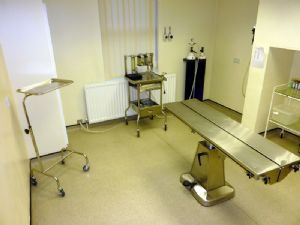
We have two operating theatres at this surgery and a further three dedicated operating theatre in the hospital, ensuring your pet’s operation is performed in a clean and well equipped environment.
Soft tissue refers to tissue that connects, supports and surrounds other structures and organs of the body. Soft tissue can be muscles, tendons, fibrous tissues, fat, blood vessels and nerves.
Surgery of this type involves a wide range of surgical treatments that include ear, nose and throat, thoracic (chest), abdominal and urogenital tract surgery in small animals.
We perform a wide range of soft tissue surgical procedures including neutering, biopsy and mass removal, wound management, bowel surgery and exploratory abdominal surgery.
Abdominal surgery is important in the removal or biopsy of tumours, investigating intestinal diseases, removing foreign bodies found in the intestine and investigating pancreatic/liver disease.

Specialist referrals for small animals at Connaught House can be initiated by your veterinary surgeon.
A number of different specialist centres and universities are used for referral depending on the exact nature of your pets problem.
A complete history of the case plus any relevant x ray or ulrasound images, lab tests etc, is forwarded to the referral vet so that the specialist can continue the investigation. This helps to avoid any repetition from occuring.
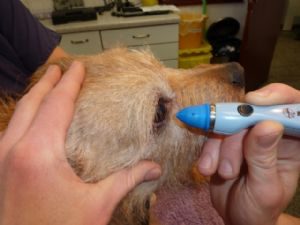
Tonometry is the measurement of pressure within the eye (called intraocular pressure) to determine if glaucoma is present.
Intraocular pressure (IOP) is the pressure exerted against the outer layers by the eyeball. Tonometry is performed using an instrument called the tonometer.
Glaucoma is caused by the buildup of fluid within the eye. Abnormally high pressure can damage the optic nerve, leading to vision loss.
Tonometry is also useful for identifying low IOP, which may occur with anterior uveitis (inflammation within the eye) or following intraocular surgery. Low IOP is also associated with dehydration.
